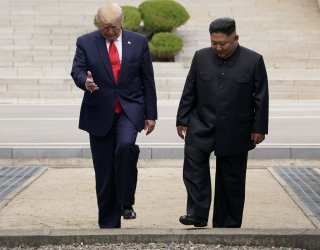Yes, Peace, Denuclearization, and Korean Unification Are Still Possible
The problem is a lack of trust and a lack of action-for-action.
Editor's Note: As the world commemorates the 70th anniversary of the start of the Korean War, the Center for the National Interest’s Korean Studies team decided to ask dozens of the world’s top experts a simple question: Do you believe that the Korean War will finally come to an end before its next major anniversary in 2025? The below piece is an answer to that question. Please click here to see even more perspectives on this important topic.
A peace treaty ending the Korean War is achievable by 2025, the 75th anniversary of the Korean War. However, North Korea’s decision to demolish the Joint Liaison Office on June 16, 2020, coupled with the vitriol from sister of Chairman Kim Jong-un and heir apparent Kim Yo-jong, will once again slow the process of reconciliation and embolden the critics of negotiations.
I nonetheless remain confident that eventual reconciliation with North Korea is possible and that substantive intra-Korean talks can lead to unification. Moreover, the denuclearization of North Korea is possible and a peace treaty ending the Korean War is necessary if we expect meaningful progress toward these goals.
North Korea wants nuclear weapons as a deterrent to any aggressor seeking regime change. Our job has been to convince North Korea that regime change is not our objective. In addition, we must show Pyongyang that, with denuclearization, a normal relationship with the United States is possible, which would entail the removal of sanctions and access to international financial institutions and foreign direct investments. To date, despite the assurances provided to North Korea with the Agreed Framework in 1994, the Six Party Talks Joint Statement in September 2005, and the Singapore Summit Statement in June 2018, North Korea has walked away from these agreements and built more nuclear weapons.
What has been missing during all these years of negotiations and resultant agreements is “trust.” Their negotiators cite Libya as an example. Our job has been to convince North Korea that they are not Libya, that they will receive the security assurances they want, and that normalization of relations with the United States is their best security assurance. Furthermore, Pyongyang must realize that economic development assistance will benefit its people and enhance the leadership’s stature, and that progress with intra-Korean negotiations will lead to peace, prosperity, and reconciliation on the Korean Peninsula as well as its eventual unification.
To achieve these objectives, a new strategy that focuses on “actions-for-actions,” where benefits accrue to North Korea as they move forward with complete and verifiable denuclearization, is necessary. This process will take time, but as long as there is progress toward denuclearization, with commensurate deliverables to North Korea, the ultimate objectives are achievable.
To regain momentum in stalled talks with North Korea, informing them that the United States is prepared to discuss a declaration to end the Korean War with a peace treaty would be a timely confidence building initiative for 2020, the 70th anniversary of the Korean War. Assuming an agreement for complete denuclearization, with timelines, is secured, a peace treaty before the 75th anniversary of the Korean War is achievable and even necessary.
Joseph R. DeTrani served as Special Envoy for the Six-Party Talks from 2003—2006 with the rank of Ambassador. He has also served as Associate Director of National Intelligence and Mission Manager for North Korea, Director of the National Counterproliferation Center, and Special Adviser to the Director of National Intelligence. The views expressed are those of the author and not of any government agency or department.
Image: Reuters

